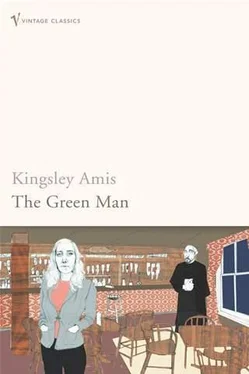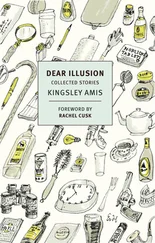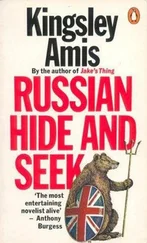‘Nick, go and get David up here.’
‘No.’ Nick’s face went hard in a way I had known for a dozen years. ‘No use keeping it up, Dad. It’s not on.’
There was silence. Joyce drew her legs up under her and smoothed her hair, not looking at anyone. Lucy clicked her lighter at a menthol cigarette.
‘What do you think?’ I asked her unwillingly.
‘No investigation, of course. We know that’s out. Basically, I agree with Nick. That is, I think you’d been under a certain amount of strain, you had ghosts in your mind, you knew the story about this Underhill character, your judgment was, let’s say, impaired by alcohol, and the lighting in the dining-room is subdued, especially over by the window. There was somebody standing there, I’m quite ready to believe, but a real person, a waiter or one of the customers. As before, you thought you saw a ghost.’
‘But the wig, and the clothes…’
‘You filled them in out of your mind.’
‘But he recognized me, and he smiled at me.’
‘Of course he did. You were his boss, or else his host, and you’d just embarrassed him slightly by calling him by the wrong name.’
‘He’d disappeared. When I—’
‘He’d moved away.’
Another silence, in which I heard Magdalena enter the apartment and go into the dining-room. I very much wanted to tell the three what had happened in the wood, if only to dissent from Lucy’s Q.E.D., but I could think of no innocent reason for having gone there, and anyway I had been under strain, alcohol, etc., then too.
‘So I imagined it,’ I said, finishing my whisky.
‘That’s what I think,’ said Lucy, ‘but it’s only what I think. I could quite easily be proved wrong.’
‘Oh, really? How?’
‘I could be proved wrong tomorrow, in fact any moment, by someone else seeing what you see—though it goes without saying that if nobody else sees what you say you see, that’s no proof you didn’t see it—or if you found out something from a ghost you couldn’t otherwise have known about, then that would be not exactly a proof, but it would weigh with me considerably.’
‘What sort of thing?’
‘Well, supposing you saw a ghost walk through what’s now part of a wall, say, but it was a doorway or something in the past, and afterwards you found evidence of the doorway which you’d never have found unaided. Anything like that—something in a book, or behind a hidden panel there was no other clue to, that sort of thing would certainly weigh with me.’
Joyce said, ‘I must go and see to Magdalena,’ and left the room. Nick was screaming quietly and rocking from side to side.
‘Oh, ballocks, darling,’ he said. ‘What if something does weigh with you? Why don’t you leave him alone and let him forget about it? Sorry, Dad, I know you’re still here. Nobody wants to see ghosts or think they see them or whatever you prefer. Can’t do you any good, even if it is all only in your mind—worse if it’s that, in fact. As I said, Dad, drop it. If there’s nothing in it there’s nothing in it. If there’s something in it, nobody with any sense would want to know.’
Putting her hands on her knees, Lucy gave a pedagogical sigh. ‘Ghosts can’t harm you. They aren’t there, as I explained earlier.’
‘You could get driven, uh, get pretty disturbed by buggering about with that kind of thing.’
‘That’s up to the person. No ghost can drive anybody out of their mind, any more than a human being can. People go out of their minds because of something about them, inside them.’
I knew, without looking, that Nick was making a face at his wife. Neither spoke. I said I would go and lie down for an hour and then probably reappear for a final drink or two and some more chat, if anybody wanted any. In the passage outside I ran into Joyce.
‘Dinner’s ready,’ she said. ‘I was just coming to—’
‘I don’t want any, thank you.’
‘You ought to eat something.’ She sounded unconvinced.
‘I’m not hungry. I might have a bit of cheese later.’
‘All right. Where are you off to now?’
‘Going to have a little nap.’
‘And then you’ll get up about the time I’m coming to bed and go and talk to Nick and then sit on your own with the whisky-bottle until about two o’clock and tomorrow I’ll see you at lunch and after that in the bar in the evening with everybody else there and so on like today and yesterday and that’s what you and I are going to do tomorrow.’
This was a very long speech for Joyce, and was charged with resentment. I decided not to ask her what of it, and said instead, ‘I know. I’m sorry, darling. This is a busy time of the year.’
‘Every time of the year is a busy time. That’s no reason why we should never see each other.’
I thought how pretty she looked, leaning against the wall of the passage just next to one of my hunting prints—prettier even than Diana, her full but finely proportioned body shown off by her blue silk dress, yellow hair smoothly piled up to reveal her handsome ears. ‘I know,’ I said.
‘Then do something about it I’m your business partner and housekeeper and Amy’s stepmother and that’s it.’
‘Is it? I make love to you too, don’t I?’
‘Sometimes. And lots of people make love to their housekeepers.’
‘I haven’t noticed you being a very active stepmother, I must say.’
‘I can’t be it on my own. You and Amy have got to join in, and neither of you ever do.’
‘I don’t think this is the time, the right day to start—’
‘It’s the right day of all days. If you’ve got nothing in particular to say to me the day after your father dies, what would have to happen to make you talk? I can’t remember the last time we … No,’ she said, catching my wrists as I stepped forward and tried to embrace her, ‘I don’t count that. That’s not talking.’
‘Sorry. Well; when would you like to have a talk?’
‘Talk, not have a talk, and when’s no good. Hopeless. There’s no time now, anyway. You go and have your nap.’ She walked past me.
Some talk was certainly going to be called for, I reflected, not only in order to get Joyce into bed with Diana and me, but as prelude to that conversation. I must start working on that first thing in the morning. Meanwhile there was work (of an unexacting sort) to be done.
I went into the dining-room, where four covered pots of soup stood on the table, and moved over to the bookshelves to the left of the fireplace. Here I kept two or three dozen works on architecture and sculpture, and a hundred or so plain texts of the standard English and French poets, stopping chronologically well short of our own day: Mallarmé and Lord de Tabley are my most modern versifiers. I have no novelists, finding theirs a puny and piffling art, one that, even at its best, can render truthfully no more than a few minor parts of the total world it pretends to take as its field of reference. A man has only to feel some emotion, any emotion, anything differentiated at all, and spend a minute speculating how this would be rendered in a novel—not just the average novel, but the work of a Stendhal or a Proust—to grasp the pitiful inadequacy of all prose fiction to the task it sets itself. By comparison, the humblest productions of the visual arts are triumphs of portrayal, both of the matter and of the spirit, while verse—lyric verse, at least—is equidistant from fiction and life, and is autonomous.
However, the book I had come to fetch lay in none of the categories mentioned. It was Joseph Thornton’s massive Superstitions and Ghostly Tales of the British Folk, in the second edition of 1838. I took it down from the shelf, poured myself a medium-sized Scotch (say a triple bar measure) and went and sat in my red padded-leather bedroom armchair.
Читать дальше











